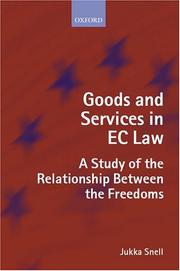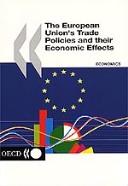| Listing 1 - 10 of 40 | << page >> |
Sort by
|
Book
ISBN: 8481555657 9788481555653 Year: 2000 Publisher: Madrid: Dykinson,
Abstract | Keywords | Export | Availability | Bookmark
 Loading...
Loading...Choose an application
- Reference Manager
- EndNote
- RefWorks (Direct export to RefWorks)
Free trade --- Libre-échange --- Libre-échange --- Free trade - European Union countries.
Book
ISBN: 9781785364303 1785364308 Year: 2016 Publisher: Cheltenham: Elgar,
Abstract | Keywords | Export | Availability | Bookmark
 Loading...
Loading...Choose an application
- Reference Manager
- EndNote
- RefWorks (Direct export to RefWorks)
This book considers how the interplay between multilateral and preferential liberalisation of trade in services increasingly raises concerns, both from the perspective of the beneficiaries of such liberalisation (whose rights are uncertain) and that of regulators (whose regulatory autonomy is constrained). The author shows how these concerns lead to vast underutilisation of, and strong prejudices against, the benefits of services liberalisation. The book meticulously analyses and compares the EU's obligations under the GATS and the services chapters of several RTAs to finally assess the merits of the raised concerns.
Book
ISBN: 3261044969 9783261044969 Year: 1992 Volume: 1260 Publisher: Berne: Lang,
Abstract | Keywords | Export | Availability | Bookmark
 Loading...
Loading...Choose an application
- Reference Manager
- EndNote
- RefWorks (Direct export to RefWorks)
Book
ISBN: 9789067042901 9067042900 Year: 2008 Publisher: The Hague: Asser press,
Abstract | Keywords | Export | Availability | Bookmark
 Loading...
Loading...Choose an application
- Reference Manager
- EndNote
- RefWorks (Direct export to RefWorks)
Economic law --- World Trade Organization --- European Union --- Free trade --- GATT --- handel, internationaal --- handelspolitiek, internationaal --- recht, internationaal --- handelsrecht --- Europese Unie --- Free trade - European Union countries
Book
ISBN: 9781849461672 1849461678 Year: 2016 Volume: 60 Publisher: Oxford: Hart,
Abstract | Keywords | Export | Availability | Bookmark
 Loading...
Loading...Choose an application
- Reference Manager
- EndNote
- RefWorks (Direct export to RefWorks)
The book's aim is to consider the impact that the introduction and development of the status of Union citizenship has had on the interpretation of the EU's market freedoms. Starting by providing, in its introductory part (part one), a comprehensive and up-to-date analysis of the status of Union citizenship and its development from 1998 onwards, the book proceeds in part two to provide an in-depth examination of the relationship between this status and the Union's market freedoms. The central argument of the book is that, as a result of the move towards the creation of a meaningful status of Union citizenship, the market freedoms have been reconceptualised as fundamental, Union citizenship, rights and their interpretation has adapted accordingly. Part three of the book analyses the result of this process of transforming the market freedoms into sources of fundamental, Union citizenship, rights and considers where it is likely to lead in the future. It demonstrates that, despite the fact that this development appears to be the next natural step in the process of constructing a meaningful notion of Union citizenship, it brings with it a number of issues that the EU will have to consider and carefully address. In particular, the method which the Court seems, up until now, to have employed to facilitate the metamorphosis of the market freedoms into citizenship rights, has led to criticisms on the grounds of legitimacy and coherence and will, undoubtedly, lead to further problems in the future. Hence part three of the book also identifies the difficulties that may emerge as a result of this process and suggests ways in which they may be overcome
Economic law --- European Union --- Citizenship --- Free trade --- Capitalism --- Citizenship - European Union countries --- Free trade - European Union countries --- Capitalism - European Union countries

ISBN: 9780199250097 019925009X Year: 2002 Publisher: Oxford : Oxford university press,
Abstract | Keywords | Export | Availability | Bookmark
 Loading...
Loading...Choose an application
- Reference Manager
- EndNote
- RefWorks (Direct export to RefWorks)

ISBN: 1280083581 9786610083589 9264188533 9264185364 Year: 1998 Publisher: Paris : OECD Publishing,
Abstract | Keywords | Export | Availability | Bookmark
 Loading...
Loading...Choose an application
- Reference Manager
- EndNote
- RefWorks (Direct export to RefWorks)
This paper retraces the Communities external liberalisation efforts, and discusses, where relevant, the repercussions of internal liberalisation on foreign competitors. The aim of the paper is to clarify, and when feasible, to quantify the economic effects of the EU’s trade policies. To this end, it provides an overview of past liberalisation efforts, reviews trade indicators in international comparison and lays out the future trade agenda of the Community. The empirical evidence provided in the paper points to little evidence for trade diversion due to integration in Europe, while trade is likely to have boosted area-wide income significantly. It is openness in general, rather than regional integration, that has favoured growth in Europe ...
Book
ISBN: 9781788974790 1788974794 1788974808 Year: 2019 Publisher: Cheltenham: Elgar,
Abstract | Keywords | Export | Availability | Bookmark
 Loading...
Loading...Choose an application
- Reference Manager
- EndNote
- RefWorks (Direct export to RefWorks)
In recent years, the EU has negotiated a number of so-called ‘new generation’ free trade agreements (FTAs) with a significant number of emerging and industrialized partners, such as Canada, Singapore, Japan, Vietnam and others. This timely book gives an overview of the main constitutional issues the EU faces in negotiating, concluding and implementing these FTAs.Featuring contributions by international specialists on EU external action, this book demonstrates why these FTAs have become challenging for the EU, as well as analysing how the EU has dealt with its institutional constraints in order to remain a major international trade actor. Chapters first examine questions around EU competences and democratic issues raised by these agreements, before dealing with their implementation and enforcement, approaching these topics specifically from an EU law perspective. Drawing on a broader research project conducted by the well-regarded LAwTTIP network, this invaluable book addresses contemporary debates and future challenges for EU institutions and Member States.Scholars and advanced students of international economic relations and international and European economic law, particularly those with an interest in EU external action, will find this book essential reading. It will also prove useful to those working in EU institutions and WTO administration.
Book
ISBN: 1847974465 Year: 2012 Publisher: New York : Crowood,
Abstract | Keywords | Export | Availability | Bookmark
 Loading...
Loading...Choose an application
- Reference Manager
- EndNote
- RefWorks (Direct export to RefWorks)
Design is at the essence of storytelling, but how does a production find its style and identity? This book explains how to approach design, whether for film, television, video promo or commercial making, and introduces the techniques needed to make ideas happen. Through theory and practical exercises, it looks at design in a different way and shows how the simplest decisions can become powerful ideas on screen. Explains the roles of the design team, including the production designer and art director; Explains how to extract design information from a script and how to identify key themes t
Book
ISBN: 1498330940 Year: 2014 Publisher: Washington, D.C. : International Monetary Fund,
Abstract | Keywords | Export | Availability | Bookmark
 Loading...
Loading...Choose an application
- Reference Manager
- EndNote
- RefWorks (Direct export to RefWorks)
This paper studies economic and financial spillovers from the euro area to Poland in a two-country semi-structural model. The model incorporates various channels of macrofinancial linkages and cross-border spillovers. We parameterize the model through an extensive calibration process, and provide a wide range of model properties and evaluation exercises. Simulation results suggest a prominent role of foreign demand shocks (euro area and global) in driving Poland’s output, inflation and interest rate dynamics, particularly in recent years. Our model also has the capability for medium-term conditional forecasting and policy analysis.
| Listing 1 - 10 of 40 | << page >> |
Sort by
|

 Search
Search Feedback
Feedback About UniCat
About UniCat  Help
Help News
News